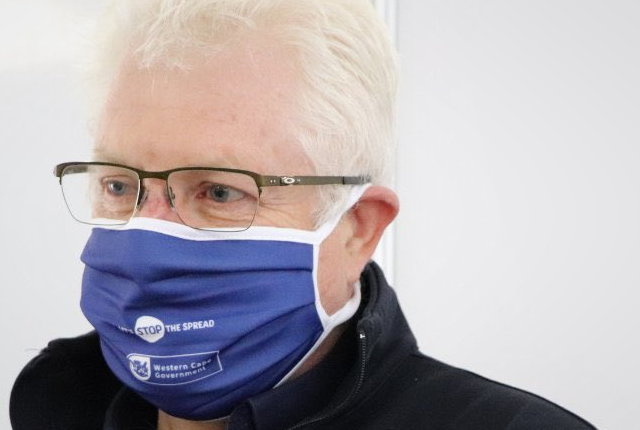Premier Alan Winde said that the Western Cape must focus on rolling out the COVID-19 vaccine as effectively and ethically as possible. Provincial government is also focusing on ensuring all systems aiding the vaccine rollout are in place before they arrive.
“The National Department of Health has now confirmed that the first 1-million doses, announced by the National Minister of Health, Dr Zweli Mkhize, are expected to arrive in the country on February 1,” Winde said.
Once this has happened certain processes need to take place before the first vaccines can be administered. This includes:
• SAPHRA needs to conduct a quality control process, which will be accelerated.
• The Biovac Institute will then distribute vaccines to the provinces. Their arrival is anticipated within the next two weeks.
• Once here, the Western Cape Department of Health will be responsible for their distribution. This will be undertaken by the Central Medical Depot.
• The Depot will distribute vaccines to provincial healthcare facilities; City of Cape Town facilities as well as to the private sector facilities.
“Vaccines are an important tool for us in fighting this pandemic, saving lives and ensuring that we can start the process of recovery in the province. We must ensure that people are able to safely return to work, and to school, that our healthcare systems can reintroduce those services which have fallen behind through the pandemic, and that our economy can start to recover,” Winde added.
It is for this reason that the Western Cape Cabinet adopted the Contingency Vaccines Acquisition strategy. Under the strategy, the Department of Health, supported by the Provincial Treasury and the Department of the Premier, must coordinate contingency arrangements and ensure that whatever vaccine is acquired, meets all the necessary requirements.
“The Western Cape fully supports the national vaccine acquisition efforts and in line with the constitutional principles of cooperative governance. However, we find ourselves in a situation globally where there is huge demand for vaccine supply, while suppliers are not yet producing vaccines at scale. A single acquisition vehicle carries inherent risk in this complex global system. This is especially the case in phases 2 and 3 of our vaccine rollout where large numbers of vaccines would be required, and the national government has not yet confirmed available supply for these phases,” Winde said.
Centralised procurement requires a contingency plan that is complementary to the national strategy. This does not mean that the province does not support or does not want to be part of the national strategy.
“We will continue to work with the national Department of Health, and we will, of course, coordinate our efforts with theirs. But we will at the same time ensure we can mitigate the risk and ensure additional pathways to source vaccines,” the Premier added.
Doing this not only reduces the risk associated with only one supply, but would also support the national effort, as any additional vaccines sourced for the Western Cape would be in support of the national cause overall.
The allocation of the first centrally procured vaccine doses to provinces is being finalized nationally. The Covishield vaccine will be used for both doses to each healthcare worker.
“In phase 1, we have targeted approximately 105 000 people working in the healthcare sector. This group includes public and private healthcare workers, community healthcare workers, care workers, health sciences students and traditional healers,” Wine said.
In phase 2, provincial government estimates vaccinating 2-million essential workers, people in congregate settings, and vulnerable groups including people older than 60, and anyone older than 18 with high-risk co-morbidities. In phase 3, a further 2.9-million people, over the age of 18 will be vaccinated.
The provincial Department of Health is currently working to finalise the minute details of the vaccination plan. This includes:
• Identifying each vaccination site, which must be accredited.
• Identifying specific vaccinators at each site who will all be trained and accredited.
“It is important to us that people understand the science behind vaccines and that we build trust,” Winde said. “It is important to us that throughout the entire vaccination programme, we are transparent, and that we share credible, science-based information with our healthcare workers who will be the first to receive the vaccine, and with members of the public.”
The Department of Health has conducted a rapid poll to determine staff readiness for the vaccine. Of the 1680 responses we have received so far, 54% have indicated that they would take the vaccine, 19% have indicated they would not, and 26% were still undecided.
“We understand that there may be a fear of the unknown, which is exacerbated by fear and mixed messages on social media and in communities,” Winde said.
Taking steps to build vaccination confidence will be carried out by:
• Addressing medical concerns such as whether the vaccine is effective, whether it is effective against the variant and whether the vaccine is safe.
• Addressing religious and cultural concerns. This week the Provincial Minister of Health, Nomafrench Mbombo, undertook a meeting with traditional healers where she engaged with them on their concerns and questions and we will continue to hold these kinds of frank discussions.
• Addressing misinformation. Throughout the pandemic, we have seen a lot of misinformation about Covid-19 and similar misinformation exists around the vaccine. As we have done from day one of the pandemic, this government will continue to be open and honest with our residents.
“We have therefore set about developing a set of tools which will provide evidence-led and quality information. This includes developing a workplace readiness toolkit, which includes answers to frequently asked questions, a presentation, guides for managers and updated publications and information,” the Premier added.
“As a province, we have worked hard to manage the pandemic and to save lives. We must ensure that we make every effort to continue to do so, without compromising the livelihoods of our residents who have already suffered tremendously under the lockdown.”
Picture: Twitter

